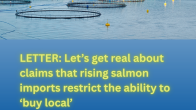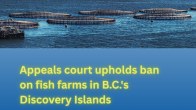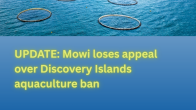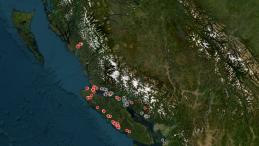Salmon Farming

Living Oceans has been working since its inception in 1989 to find solutions to the harm caused by open netpen salmon farms. We have worked directly with scientists, the industry, the regulators and the general public to educate and inspire action to protect wild salmon. We've gone to Court to defend wild salmon against the parasites, pathogens and pollution generated by the farms. We helped catalyse the development of the first-ever land-based salmon farm in the hope that industry would evolve to safer ways to produce farmed salmon and provide employment in coastal communities.
Today, the Kuterra land-based salmon farm located on the traditional territory of 'Namgis First Nation near Port McNeill, BC produces sushi-quality salmon in the pioneering facility that showed the world it could be done. All over the globe, land-based farms are in development: as at 2023, 1.8 million metric tonnes of salmon is slated for land-based production. But in Canada, there are only a few, small land-based farms and the major salmon farming companies operating in our waters show no interest in land-based developments. Those same companies are opening land-based farms elsewhere in the world, but why would they do so here, when they can pollute for free?
Living Oceans is deeply engaged in making sure the government makes good on its promise to remove salmon farms from BC waters by 2025. We've been working with the regulator on a Transition Plan that will eliminate impacts on wild salmon. This means removing them from the water altogether, because there is no technology that can protect wild salmon from the pathogens and parasites in farm effluent. Read our report, "Lousy Choices: Why Salmon Farms have to come Out of the Water" to see how ocean-based technologies fail to protect wild salmon.
At the same time, we have to consider the livelihoods of people in remote, coastal communities. That's why we're working to support the development of regenerative forms of aquaculture on a community scale--activities like off-bottom shellfish farming or seaweed farming can actually improve habitat for all sea life and contribute to ocean health. Scaled at a level that can be managed by coastal communities, these operations could provide jobs while keeping profits in the community. We're also advocating for land-based aquaculture facilities for more than just salmon: there are many species of fish that have been raised successfully in recirculating aquaculture facilities (RAS) that generate no pollution at all.
There are always solutions. It's really just a matter of educating the decision-makers and supporting them to do the right thing. Supporting them means showing them how you feel about the protection of wild salmon, so never doubt that when you click to send a letter, you are making a difference!
Resources:
Published science concerning sea lice from salmon farms affecting Wild Salmon
Food Security and Salmon Aquaculture





